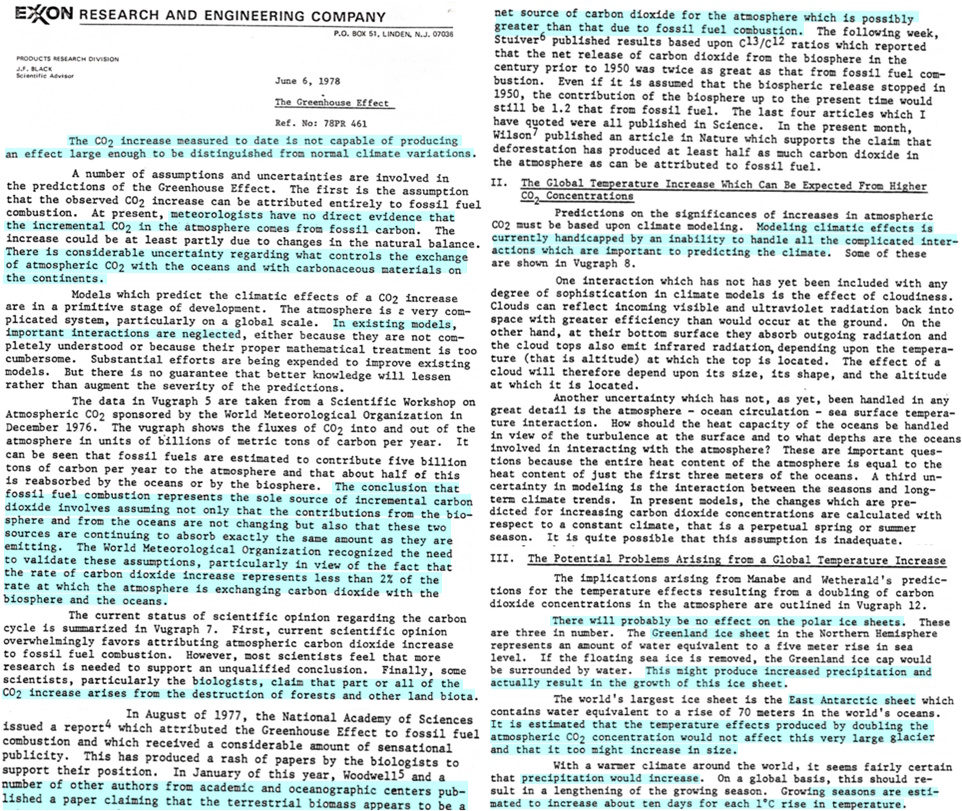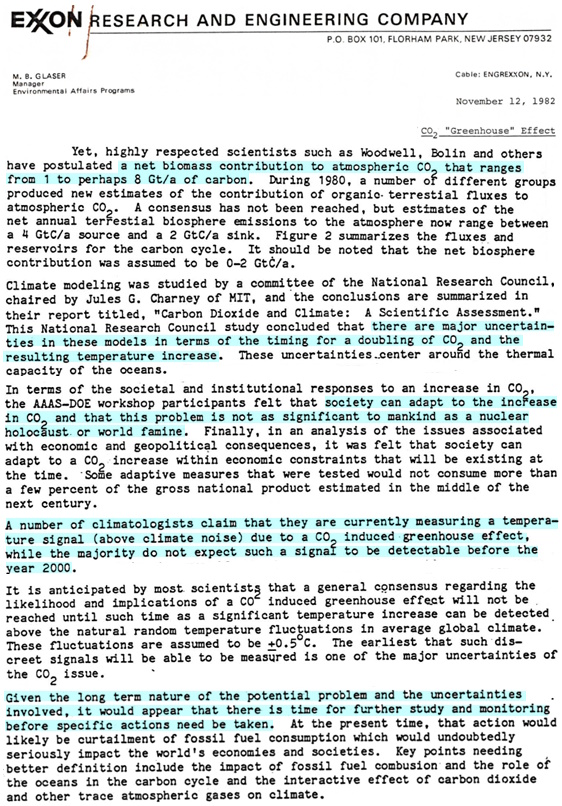In the 1970s and 1980s ExxonMobil did not know that their reports would be so wrongly misinterpreted in the 2010s.
Since 2015, when “investigative journalists” uncovered reports written in the late 1970s by ExxonMobil’s Science Advisor J.P. Black, it has been a common talking point in alarmist circles to insist that “Exxon Knew” about the looming climate catastrophe imposed by continuing to use their petroleum products.
“ExxonMobil had known that burning fossil fuels would lead to potentially catastrophic climate impacts as early as the late 1970s.” – ExxonKnew.org
“Exxon disputed climate findings for years. Its scientists knew better.“
The accusation is that Exxon was pushing their products knowing full well – with certainty – how much damage they caused.
Exx0nMobil 1977 Report
But if one were to actually read these internally published scientific reviews, it would be difficult to find even a hint of this definitive certainty pertaining to the science of climate change in the 1970s.
In the most notorious 1977 review (the written report was published in 1978), J.P. Black emphasized there is considerable uncertainty whether the increase in CO2 was all or even mostly due to fossil fuels. The fundamental claim that fossil fuels drive CO2 level changes was still considered a never-validated assumption, as nature may contribute more to CO2 increases than human fossil fuel emissions do.
“The CO2 increase measured to date is not capable of producing an effect large enough to be distinguished from normal climate variations.”
“A number of assumptions and uncertainties are involved in the predictions of the Greenhouse Effect. At present, meteorologists have no direct evidence that the incremental CO2 in the atmosphere comes from fossil carbon.”
“There is considerable uncertainty regarding what controls the exchange of atmospheric CO2 with the oceans and with carbonated materials on the continents.”
“The conclusion that fossil fuel combustion represents the sole source of incremental carbon dioxide involves assuming not only that the contributions from the biosphere and from the oceans are not changing but also that these two sources are continuing to absorb exactly the same amount as they are emitting. The World Meteorological Organization recognized the need to validate these assumptions…”
“…biologists claim that part or all of the CO2 increase arises from the destruction of forests and other land biota.”
“…a number of other authors from academic and oceanographic centers published a paper claiming that the terrestrial biomass appears to be a net source of carbon dioxide for the atmosphere which is possibly greater than that due to fossil fuel combustion.”

Image Source: Black, 1977 (ExxonMobil Science Advisor)
The report also says that if the globe warms as predicted by models of doubling the CO2 concentration:
“…there will probably be no effect on the polar ice sheets.”
The Greenland ice sheet will experience “increased precipitation and actually result in the growth of this ice sheet.”
For East Antarctica’s ice sheet, doubled CO2 “would not affect this very large glacier and…it too might increase in size.”
Climate models are “primitive” and incapable of handling important aspects of climate.
“Modeling climatic effects is currently handicapped by an inability to handle all the complicated interactions which are important to predicting the climate. In existing models, important interactions are neglected.”
And there are benefits of a warmer climate around the world.
In a warmer world, “precipitation would increase. On a global scale, this should result in the lengthening of the growing season. Growing seasons are expected to increase about ten days for every 1°C increase in temperature.“
Exx0nMobil 1982 Report
The 1982 ExxonMobil report continued to express uncertainty about the origins of the CO2 increase, saying nature may be a net source of CO2 to the atmosphere.
There was also no consensus on the detection of a CO2-induced temperature warming, as a majority of climatologists at the time thought CO2’s impacts would not be detectable until 2000.
“A number of climatologists claim that they are currently measuring a temperature signal (above climate noise) due to a CO2 induced greenhouse effect, while the majority do not expect such a signal to be detectable before the year 2000.”
And most importantly, Exxon still did not know climate catastrophe was the inevitable consequence of using petroleum products in the 1980s. They suggested otherwise, saying we can adapt to the changes. The consequences of fossil fuel burning are uncertain and in need of further study. No “specific actions” need be taken until we learn more.
“…society can adapt to the increase in CO2 and this problem is not as significant to mankind as nuclear holocaust or world famine.”
“Given the long term nature of the potential problem and the uncertainties involved, it would appear that there is time for further study and monitoring before specific actions need be taken.”






Basically everything highlighted in blue marker, is still the current state of climate “science” (sic)
Even now, CO2 warming is nothing but a modelled conjecture.
Many AGW-zealots are still stuck back in the mid 1800’s. !
“Exxon Knew” should change to “Exxon Was Right!”
[…] Read more at No Tricks Zone […]
https://wattsupwiththat.com/2016/04/18/smoke-fumes-part-deux-exxon-knew-the-entire-theory-of-climatic-changes-by-co2-variations-is-questionable/
[…] From NoTricksZone […]
[…] The Claim ‘Exxon Knew’ Their Products Induced ‘Catastrophic Climate Impacts’… […]
Exxon should sue for harassment. Big money